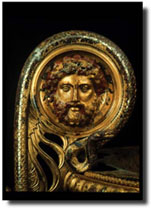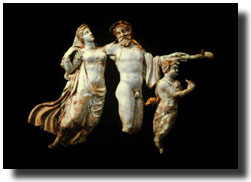![[ Macedonia by Nicolas Martis]](../images/macedonia.gif)
![[ Macedonia by Nicolas Martis]](../images/macedonia.gif)
The Macedonian Question, is more than a mere squabble over a name. It is a
well-designed scheme for annexing the northern Greek provinces of Macedonia
 and Thrace. It started during the inter-war period, by the decisions of the
Comintern and the Balkan communist parties seeking to establish a united
(Macedonian and Thracian) State. Subsequently it was Tito, in 1944, who
tried to establish such a State within Yugoslavia. He changed the name of
Southern Serbia (which had been known as Vardashka since 1913) to "Macedonia"
and then proceeded to establish, out of the Slavs of the
region (Bulgarians and Serbs), a new Slavic nation inappropriately called
"Macedonian" (See Document No 4).
and Thrace. It started during the inter-war period, by the decisions of the
Comintern and the Balkan communist parties seeking to establish a united
(Macedonian and Thracian) State. Subsequently it was Tito, in 1944, who
tried to establish such a State within Yugoslavia. He changed the name of
Southern Serbia (which had been known as Vardashka since 1913) to "Macedonia"
and then proceeded to establish, out of the Slavs of the
region (Bulgarians and Serbs), a new Slavic nation inappropriately called
"Macedonian" (See Document No 4).
To transform this theoretical concept into a political reality Tito:
Thus, politicians and historians collaborated:

Their theoretical basis for these claims was based on the assertion that:
World history does not record a similar case of usurpation of a people's name and history by another group of people.
Lack of the slightest credibility on the part of the pseudo-Macedonian "nation" of Skopje is furthermore revealed by the single fact that Skopje's Bulgarians and Serbs discovered only after 1944 that back in the sixth century they had been transformed from Slavs into Macedonians.
To claim that the Ancient Macedonians were not Greeks, however, and to use the term "Slav" with reference to the creation of the "Macedonian nation" is a trick.
The "Macedonian Nation" does not, nor did it ever exist. The Macedonians were Greeks, they spoke the same language and worshipped the same gods (who were inhabiting the Macedonian mountain of Olympus) and performed the same sacrifices, in the same sanctuaries as all the other Greeks.
The Macedonians, together with the rest of Greeks, possess according to Herodotus, the kind and constituent element that composed a nation:
"And next the kinship of all Greeks in blood and speech, and the shrines of gods and the sacrifices that we have in common and the likeness of our way of life " Herodotus, History VIII, 144,2 (Loeb, A.D. Godley) .
![[ Back ]](../images/back.gif)
![[ Next ]](../images/next.gif)
![[ Imagemap ]](../images/buttons1.gif)